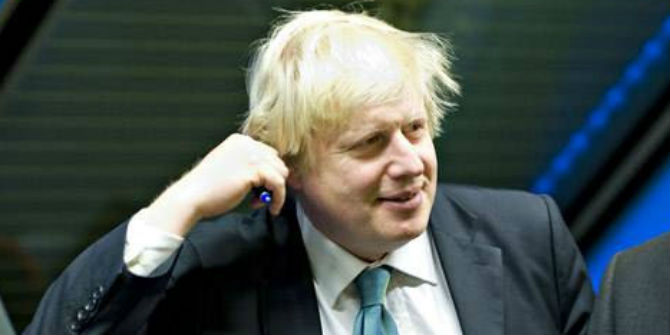The multilateral e-commerce negotiations presently being conducted within the World Trade Organization signify a new era within the global trading regime. In an attempt to repair the dysfunctional and log-jammed WTO through a modernized update on digital trading rules and regulations, the organisation now stands at a critical crossroads in the determination of multilateral economic exchange via electronic means. Can Global Britain be achieved through these negotiations, asks Robert Bailey (LSE)?
Digital trade represents a vital and continually expanding segment of the British economy. In the current post-Brexit context, in which the UK aims to independently strike a wider variety of free-trade agreements as part of its ‘Global Britain’ agenda, digital trade enables the UK to extend its economic influence abroad while spurring job growth domestically. Data from the Department for International Trade identified that in 2018, approximately 70% of the UK’s services exports were provided digitally. In that same year, digital businesses produced £149 billion for the domestic British economy, contributing 8% to the UK’s gross value added and employing more than 1.5 million Brits. These figures are on an upward trajectory, and the DIT has heavily emphasized the growing significance of digital trade in new bilateral negotiations with both Japan and the United States.
The UK Board of Trade recently published a report that also stresses the strategic value of digital trade for the British economy. As the fifth-largest global exporter of digital services, the UK is well-positioned to further capitalize on digital growth trends in the aftermath of a pandemic that accelerated e-commerce. Domestically, the Board of Trade recognizes that digital trade is growing four times faster than the overall economy, spanning a plethora of industries and even including the third most amount of ‘tech unicorns’ in the world. As the UK continues its digital trade negotiations within the WTO forum, these considerations are therefore likely to inform a British strategy that favours a global expansion of its digital offerings.

UK Digital Trade Negotiations: Key Preferences
As a significant player in the multilateral WTO e-commerce talks, the UK maintains a set of core negotiating objectives that are central to its digital trade strategy. These key preferences can be broadly summarized into four categories: 1) the development of a robust regulatory framework that recognizes the legal equivalence of digital and paper documents; 2) the establishment of open and fair trade through the maximization of cross-border data flows; 3) provisions for the protection of intellectual property rights and the elimination of data localization requirements; and 4) the maintenance of comprehensive standards on development that ensure regulatory cooperation and the permanence of the moratorium on digital customs duties.
As an intermediary between the US and EU, the UK looks to exert itself as a figure of compromise on topics like consumer data privacy that threaten the completion of a multilateral agreement. Despite no longer being a member of the EU, the UK has pledged to continue its adherence to the EU’s GDPR and its own Data Privacy Act 2018. Long-term, however, it is highly plausible to expect the UK to align more closely with the US on a market-led, industry-based approach to data protection. The ongoing negotiations, therefore, present the UK with an opportunity to bridge this divide and set the foundations for a more open data marketplace. The prevention of a global splinter into three distinct regulatory blocs – the US, EU and China – is a high priority for the UK as it seeks to expand trade of its digital offerings within North America, Europe and Asia. Given the prominence of SMEs in the British digital landscape, the role of the UK is also critical in promoting its preference for a world ecosystem that is conducive to digital trade for SMEs and not just tech giants like Amazon. Over 99 per cent of private sector businesses in the UK are SMEs, but only 9.5 per export abroad. The UK is eager to increase the global presence of these businesses, and the current WTO negotiations present the optimal opportunity for doing so. By negotiating along the parameters of these key preferences, the UK is primed for a much stronger influence on the global digital trade marketplace.
UK Digital Trade Negotiations: Primary Challenges
Despite the optimism that many in the UK experience when discussing the potential for a renaissance of the global digital trading regime, it is necessary to outline the roadblocks that may inhibit the successful completion of a WTO agreement. Within the WTO, the obvious challenge is facilitating compromise between the US, EU and China. Particularly on matters of data privacy and special and differential treatment for developing economies, there is the potential for disagreement that could upend the multilateral vision. Although the UK can exercise a role in brokering a compromise, the fate of the agreement is largely out of the UK’s control because its digital businesses do not comprise enough of the global market share to warrant greater influence at the negotiating table.
Relatedly, the second key challenge that the UK faces is that of reconciling its win-set at the international level with a ratifiable solution that appeases both Whitehall and Westminster domestically. A report produced by the University of Oxford identified an overarching lack of internal cohesion and coordination on policy within the Government and its key stakeholders. Although the Parliamentary International Trade Committee is now conducting an official inquiry into digital trade and data, the two-level international negotiating position of the UK is unlikely to provide a domestically-beneficial strategy until there is substantial input from leading businesses, consumer groups, trade unions, policy experts, and the devolved administrations in Scotland, Wales and Northern Ireland. For the UK to be successful at the WTO, it, therefore, must derive a clearer strategy from its domestic stakeholders so that it can effectively socialize solutions on the international level that will not only benefit British digital businesses, but will also be palatable to the American, European and Chinese delegations.
Conclusion
Digital trade is a dynamic and exciting element of the global economic system, and the UK proudly stands at the forefront of its expansion. A WTO agreement on e-commerce would drastically benefit the UK, both at home and abroad as a rejuvenated and independent global influence. As the UK proceeds with its negotiations in the pursuit of an agreement, British digital trade continues to flourish – offering profound hope that e-commerce will serve as a cornerstone of what a Global Britain can bring to the world in the 21st century.
This post represents the views of the author(s) and not those of the Brexit blog, nor of the LSE. This blog post introduces is part of a series on digital trade that emanates from an extended and detailed simulation of the current WTO negotiations on e-commerce by LSE Masters students in the International Relations Department.







intermediary between the US and EU, the UK looks to exert itself as a figure of compromise on topics like consumer data privacy
As a result of Brexit, the HMG’s implementation of the NI protocol & the Internal Markets Bill – the UK is not acceptable as an intermediary to the EU, and certainly not Biden in the interpretation of Data Privacy requirements. Especially as the author identifies that HMG’s intent of to align with US standards eventually
One or two matters left behind:
1. Taxation. How do you tax digital transactions? Necessary in order to implement a long-term stable system. Current system is under the buttresses of different countries not very keen on having deliveries made within their borders without some gains for them. If UK is a net exporter, it will be glad to maintain the present status quo. If UK is a net receiver of digital services, it will try to implement a taxation system.
2. When you’re a developing country you may have an immediate need for digital services but you must at the same protect your own digital services in order to enable your own development.if not, you will maintain your own e o omy in the lower tier without any hope for long term development as you can’t retain bright people and money, the heart of that economy.
3. UK believing being a trusted intermediary in-between US and EU n digital matters is quiet amazing when it can not be trusted when discussing brexit matters. Don’t even takes into account that digital surveillance in UK is more on par with China’s views than EU’s. More accurately Britain’s surveillance system is very very developed coupled with a sound disregard with human rights.